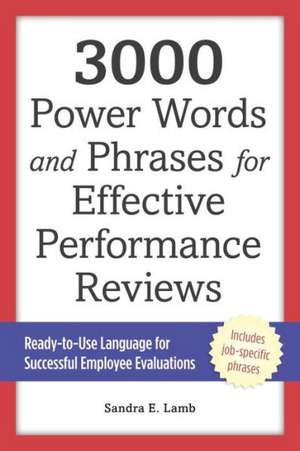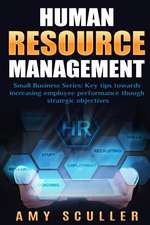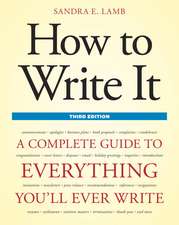3000 Power Words and Phrases for Effective Performance Reviews: Ready-To-Use Language for Successful Employee Evaluations
Autor Sandra E. Lamben Limba Engleză Paperback – 26 aug 2013
Performance reviews are one of the best tools managers have to shape company talent and culture, develop strong channels of communication with employees, and create systemic change. In this pithy, user-friendly handbook, author and writing teacher Sandra E. Lamb lays out the best methods and proven tactics to administer productive evaluations that benefit both parties— and the company. Lamb teaches managers how to design scoring systems for employees, prepare for and conduct in-person and written reviews, and use the right key words. Covering both hard and soft skills, this indispensible reference includes lists of powerful words and phrases that clearly describe positive and negative performance. Featuring sections targeted to specific industries and jobs, this guide empowers managers at all levels to master the art of performance reviews that achieve results.
Sandra E. Lamb is a consultant, speaker, former CEO, and the author of How to Write It, Personal Notes, and Write the Right Words. She lives in Denver, CO.
Preț: 82.45 lei
Nou
Puncte Express: 124
Preț estimativ în valută:
15.79€ • 16.27$ • 13.25£
15.79€ • 16.27$ • 13.25£
Carte disponibilă
Livrare economică 01-15 februarie
Livrare express 18-24 ianuarie pentru 26.58 lei
Preluare comenzi: 021 569.72.76
Specificații
ISBN-13: 9781607744825
ISBN-10: 1607744821
Pagini: 245
Ilustrații: ONE COLOR
Dimensiuni: 141 x 210 x 17 mm
Greutate: 0.26 kg
Editura: Ten Speed Press
ISBN-10: 1607744821
Pagini: 245
Ilustrații: ONE COLOR
Dimensiuni: 141 x 210 x 17 mm
Greutate: 0.26 kg
Editura: Ten Speed Press
Notă biografică
SANDRA E. LAMB began her career in the field of technical writing, then moved on to a progression of organizational management and CEO positions. Along the way she developed and administered performance review and employee bonus programs that helped both her organization and her employees succeed.
Lamb has researched and written texts in business organization and management, and brings to 3000 Power Words and Phrases for Effective Performance Reviews the kind of lightening accuracy and expert feel for the most effective words and phrases she demonstrated in her award-winning book, How to Write It, now in its third edition. She is also the author of Personal Notes and Write the Right Words.
For more information, or if you are interested in having her as a speaker, spokesperson, or consultant, visit SandraLamb.com.
Lamb has researched and written texts in business organization and management, and brings to 3000 Power Words and Phrases for Effective Performance Reviews the kind of lightening accuracy and expert feel for the most effective words and phrases she demonstrated in her award-winning book, How to Write It, now in its third edition. She is also the author of Personal Notes and Write the Right Words.
For more information, or if you are interested in having her as a speaker, spokesperson, or consultant, visit SandraLamb.com.
Extras
Introduction:
The Value of Power Words
Amy (let’s call her) has an office next to the corner office, which is occupied by her boss, whom we’ll call Ted. Both Ted and Amy have been in these offices for three years. The two share a common wall; and they frequently overhear telephone conversations the other is having while negotiating with a client or coworker.
Ted and Amy go to all the same product release and sales meetings. They see each other in the elevator and break room; and sometimes they casually chat about upcoming holidays, how Ted’s children are doing in school, or the general state of the national and international economies.
Ted likes Amy and feels that she’s doing a good job as district sales manager. The strange thing here is that Ted has, for the entire three years he’s been Amy’s boss, communicated with her for work assignments, updates, progress reports, general information, and even for her performance reviews, entirely by email. He has not conducted a single face-to-face encounter to discuss how she is performing in her role as district sales manager. In short, Ted is clueless about his role as supervisor.
Clearly, Ted either feels entirely unqualified to conduct a face-to-face meeting, or he suffers from a fear of confrontation—or both. He seems to feel that doing an in-person performance review, or directly discussing other situations with Amy, offers the possibility that an unpleasant confrontation could occur. She could disagree with his assessment. She could challenge him. So Ted avoids such encounters.
While Ted is meeting his own personal goal of avoiding a possible confrontation, he is not meeting his responsibility as a supervisor/manager. Privately, he admits that he was unprepared for this role, and it’s one he’s not comfortable in. Avoiding a face-to-face meeting with Amy is his way of trying to dodge this part of his job.
But he is doing Amy, and their company, a severe disservice.
The result of Ted’s failure to have a face-to-face review is that Amy doesn’t feel she has any real connection to Ted, nor does she feel a sense that they are teammates working together to achieve common corporate goals. In fact, the absence of this vital part of the review process has meant that Amy hasn’t gotten the feedback she needs to perform at her full potential, nor has she gotten vital input that would help her set her future career goals. She doesn’t know how she’s performing in her sales manager role within the organization as a whole.
Hopefully, Ted will buy a copy of this book. And when he follows the simple steps in these pages, he will be able to easily overcome his fear of conducting meetings with Amy. This book will give him the tools—the exact power words—to do his job of manager efficiently and expertly.
It will help Amy, too. Following the simple steps in this book will mean that Ted, Amy, and their organization will all perform at a much higher level.
The Value of Power Words
Amy (let’s call her) has an office next to the corner office, which is occupied by her boss, whom we’ll call Ted. Both Ted and Amy have been in these offices for three years. The two share a common wall; and they frequently overhear telephone conversations the other is having while negotiating with a client or coworker.
Ted and Amy go to all the same product release and sales meetings. They see each other in the elevator and break room; and sometimes they casually chat about upcoming holidays, how Ted’s children are doing in school, or the general state of the national and international economies.
Ted likes Amy and feels that she’s doing a good job as district sales manager. The strange thing here is that Ted has, for the entire three years he’s been Amy’s boss, communicated with her for work assignments, updates, progress reports, general information, and even for her performance reviews, entirely by email. He has not conducted a single face-to-face encounter to discuss how she is performing in her role as district sales manager. In short, Ted is clueless about his role as supervisor.
Clearly, Ted either feels entirely unqualified to conduct a face-to-face meeting, or he suffers from a fear of confrontation—or both. He seems to feel that doing an in-person performance review, or directly discussing other situations with Amy, offers the possibility that an unpleasant confrontation could occur. She could disagree with his assessment. She could challenge him. So Ted avoids such encounters.
While Ted is meeting his own personal goal of avoiding a possible confrontation, he is not meeting his responsibility as a supervisor/manager. Privately, he admits that he was unprepared for this role, and it’s one he’s not comfortable in. Avoiding a face-to-face meeting with Amy is his way of trying to dodge this part of his job.
But he is doing Amy, and their company, a severe disservice.
The result of Ted’s failure to have a face-to-face review is that Amy doesn’t feel she has any real connection to Ted, nor does she feel a sense that they are teammates working together to achieve common corporate goals. In fact, the absence of this vital part of the review process has meant that Amy hasn’t gotten the feedback she needs to perform at her full potential, nor has she gotten vital input that would help her set her future career goals. She doesn’t know how she’s performing in her sales manager role within the organization as a whole.
Hopefully, Ted will buy a copy of this book. And when he follows the simple steps in these pages, he will be able to easily overcome his fear of conducting meetings with Amy. This book will give him the tools—the exact power words—to do his job of manager efficiently and expertly.
It will help Amy, too. Following the simple steps in this book will mean that Ted, Amy, and their organization will all perform at a much higher level.
Recenzii
"Sandra Lamb has come up with a fantastic framework for organizing performance reviews and suggestions for how to best give finely-tuned feedback with eloquent words. This is a marvelously clever and much-needed book. Words don't always come easy these days, and wordsmiths are a dying breed. Sandra is one of the very best. I highly recommend this book to you."
-RICHARD N. BOLLES, author of What Color Is Your Parachute
“If a manager desired a ‘how-to’ book that made performance reviews quick, easy and immediately useful, this is the book. I am recommending this book to every company I consult to. Why? Because it definitely is the best performance review book ever written.”
-MICHAEL MERCER, Ph.D., author of Hire the Best & Avoid the Rest
-RICHARD N. BOLLES, author of What Color Is Your Parachute
“If a manager desired a ‘how-to’ book that made performance reviews quick, easy and immediately useful, this is the book. I am recommending this book to every company I consult to. Why? Because it definitely is the best performance review book ever written.”
-MICHAEL MERCER, Ph.D., author of Hire the Best & Avoid the Rest













